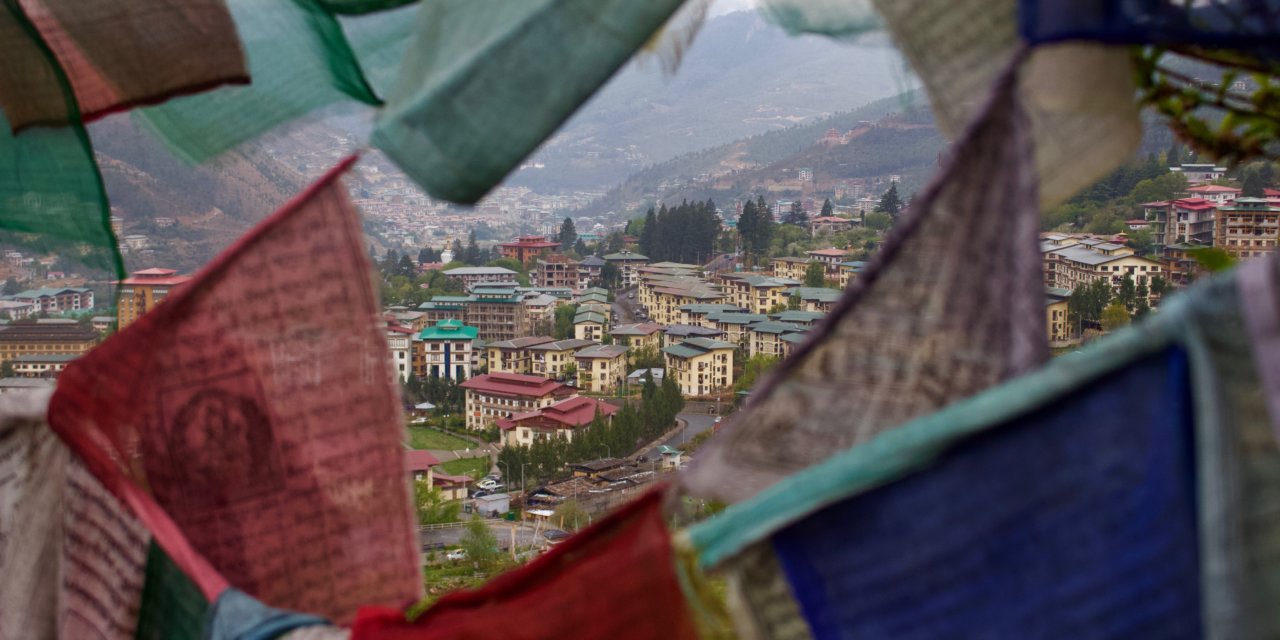Fidgeting with the utensils laid out before me, I scanned the table around which thirteen fresh faces sat. Chungur, our Bhutanese guide, stood at the head, regaling us with information about the country in which we’d all landed mere hours earlier. The dress, the food, the dzongs. The roads, the dogs, the language. After a long day of travel, his words hung in the air, very few finding functional space in my brain. That is, until the words night hunting escaped from Chungur’s mouth. I perked up, curious as to what this might mean.
“If a man approaches you,” he explained, “asks where you’re staying, and you provide the name of your hotel, that’s considered a yellow light.”
Proceed with caution, I thought. But toward what?

“He’ll then ask your room number, which, if shared, gives him the green light he sought,” Chungur continued calmly. “The go ahead to sneak into your room for sex.”
My eyes widened. My breath stopped. My head swiveled from traveler to traveler, finding their expressions mirroring the extreme shock I too felt. Of course I’d never provide an absolute stranger with my living quarters, at home or abroad. But the fact that even the innocent question of hotel location could lead to unknowingly agreed upon intercourse baffled me; particularly in a buddhist country known for its Gross National Happiness, a country that claims to value women and actually passes inheritance down to daughters rather than sons.
I quickly asked for clarification, thinking perhaps Chungur was pulling our collective leg, having slipped in a joke to ensure we were paying attention. But, even keeled and without missing a beat, he proceeded to explain the practice of Night Hunting, known as bomena in Dzongkha, the language of Bhutan.

Literally translated into “going toward a girl,” Bhutanese boys do just that. Upon spotting a woman of interest, they approach and inquire as to her address and room location. In opting to provide said information, the woman indicates her reciprocated feelings and they part ways, knowing they’ll reunite in the cover of dark. With the setting of the sun, the boy then sneaks out of his home and into hers, for conversation and additional intimacies. As night fades to day, the boy slips back out, returning home before the sun makes its full appearance.
Rather than blind dates, online apps or familial introductions, night hunting has been the relationship practice in Bhutan for generations, particularly in the eastern and central regions. In fact, it is often how spouses find their partner, as ideally the practice culminates when the visitor is found in the girl’s bed the next morning. By consciously remaining in her home, his discovery is considered a declaration of their intent to marry.
Manifested as such, bomena is no different from any other dating ritual, a custom in which both parties have consented and know what to expect. The participants recognize that in answering the posed questions, they’re agreeing to a nighttime visitor. It can lead to romance, marriage and happy families. Bruises accrued from the challenges faced in finding the house, the widow and the woman (quite a feat considering often multiple family members share a room), are the only potential blemishes that arise throughout the encounter.

Yet, throw in power dynamics and the entire tradition transforms. Wealthy men might approach women of lower socioeconomic backgrounds. Believing they are showing genuine interest, the women happily provide their information, excited that individuals of such stature would consider marrying them. But come morning, the men have fled, leaving these women not only alone but often pregnant. Other men, not wanting or needing to commit, might sneak from house to house, looking for multiple partners and subsequently increasing the spread of sexually transmitted diseases. Sometimes, these late night arrivals occur without permission or consent at all.
An unsuspecting tourist isn’t likely to find herself in one of the above mentioned scenarios but that certainly doesn’t mean she can’t or won’t encounter the practice and the feelings that accompany it. In fact, a fellow traveler found herself the target of someone’s interest just a week into our trip.
Wandering the tight quarters of a convenience store in the town of Pokhara, looking for snacks to satiate our Western cravings, a young Bhutanese man approached my friend Ali. Busy perusing the chip options, she paid no notice until he spoke, his tone calm and his wording clear.

“What hotel are you staying in?” he inquired. No hello; no introduction; just an opening line that felt well-practiced and whose intent was unmistakable. Caught completely off guard, Ali stammered, turning to us in disbelief. Her suitor continued to stare at her intently, awaiting for what he’d hoped to be a yellow light. Instead, face a tad flushed, Ali walked away, us trailing just behind.
Nothing tangible came out of her encounter, as she’d chosen ignorance over validation. But his words and the experience itself shifted the image she had constructed of Bhutan. As for us, her witnesses, no one had fully believed what Chungur had told us that first night in Thimphu. We’d accepted that it had been a practice, a way that perhaps the older generation had wed. But never, until that moment, did we fully realize its existence in the present.
We saw first hand that afternoon that the tradition of night hunting continues in Bhutan. Some advocates hope to put an end to it. Others see a charm in the more rudimentary method of courtship. Regardless of one’s opinion or preference, understanding its context, both past and present, allows visitors to construct a more comprehensive view of the country.
For ideas on how to spend your time in Thimphu, check out these 14-Things to Do and be sure to read the 16-Things to Know Before Traveling to Bhutan. You’ll be perfectly prepared for your trip!





